A new piece from the Associated Press focusing on the rise of the Constitutional Carry movement is more narrative than news, with the press outlet trying to make the case that support for law enforcement and support for permitless carry measures are somehow at odds with each other. Reporter Lindsay Whitehurst points to objections to Constitutional Carry measures by some police officials in Texas, Tennessee, and Louisiana while mostly ignoring the support for permitless carry from others in law enforcement.
“We feel it was just another opportunity to get our officers hurt,” said Fabian Blache Jr., executive director of the Louisiana Chiefs of Police Association. “It was a danger to law enforcement.”
There, a last-ditch public plea by dozens of Louisiana law enforcement officers helped narrowly avert a push to override the Democratic governor’s veto of legislation dropping concealed-carry permit requirements. But he expects the proposal to come back next year, and in several other conservative-leaning states police opposition didn’t stop laws dropping permit requirements.
… Not knowing who might be carrying a gun heightens the potential danger in any encounter, and less required training means more people who don’t know how to properly handle a weapon, Blanche said.
“Police officers are trained around the country, and they make mistakes,” he said. “So why are we going to give opportunity to people who are not trained to be able to carry a firearm and use it at will?”
“There is something of a disjunction between repeating the political slogan of ‘back the blue’ versus supporting policies that rank-and-file police and leaders of police organizations actually support,” said Robert Spitzer, a professor at The State University of New York-Cortland and author of “The Politics of Gun Control.”Police opposition hasn’t stopped a push to drop permitting requirements that’s passed in about 20 states, Spitzer said. While their positions carry authority, they don’t have the ad campaigns and lobbyists that overtly political interests often do.“Their voices and opinions have been known, but they haven’t been a real megaphone in public political terms because that puts them in a real bad spot. They’re public servants and their job is to enforce the law, no matter what the law is,” he said.
Alan Gottlieb with the Second Amendment Foundation argued that policing is already inherently dangerous and dropping permits won’t make a big dent but will enhance gun rights. “I shouldn’t need a permit to exercise my constitutional rights,” he said.
Police opposition had helped keep the idea from gaining traction even in firearm-friendly Texas, but with a change in legislative leadership support swelled over the span of a few weeks this year. It passed over objections from survivors of the mass shooting that killed 23 people at an El Paso Walmart two years ago.
“One thing I’ve learned in my many years of working with police is, you can rely on them to tell you what’s going to put the public at danger,” said Everytown For Gun Safety President John Feinblatt. “I think that what police know is that crime is rising around the country and this is the worst possible moment to pass laws like this.”
That’s rich, considering Everytown for Gun Safety’s claim that “police violence is gun violence”. Gun control activists like Feinblatt only listen to the voices of law enforcement officers when they’re parroting the talking points of anti-gun activists. When these same officers oppose gun control laws, however, activists like Feinblatt are more than happy to ignore what police have to say. In North Carolina earlier this year, sheriffs came out in favor of repealing the state’s pistol purchase permit requirement, for instance, but gun control activists pushed hard to keep the Jim Crow-era law in place.
Strangely, when gun control activists and police found themselves on the opposite side of that issue, the Associated Press took no notice. It’s almost like the opinions of cops are only newsworthy when they’re promoting restrictions on the right to keep and bear arms, rather than defending the right itself.









Join the conversation as a VIP Member